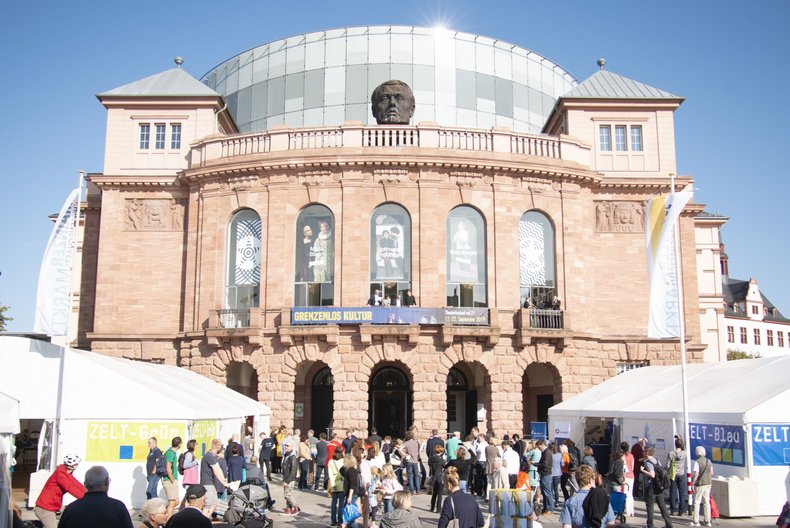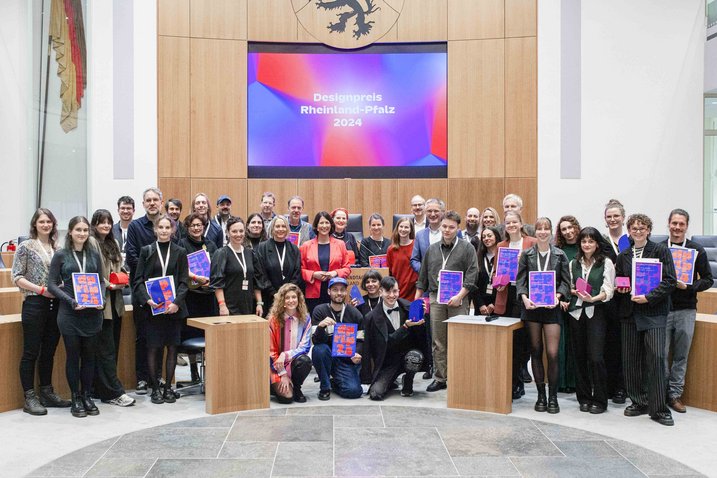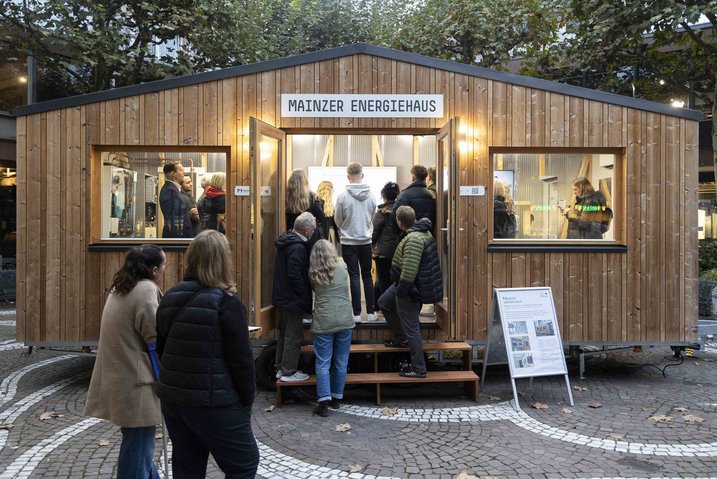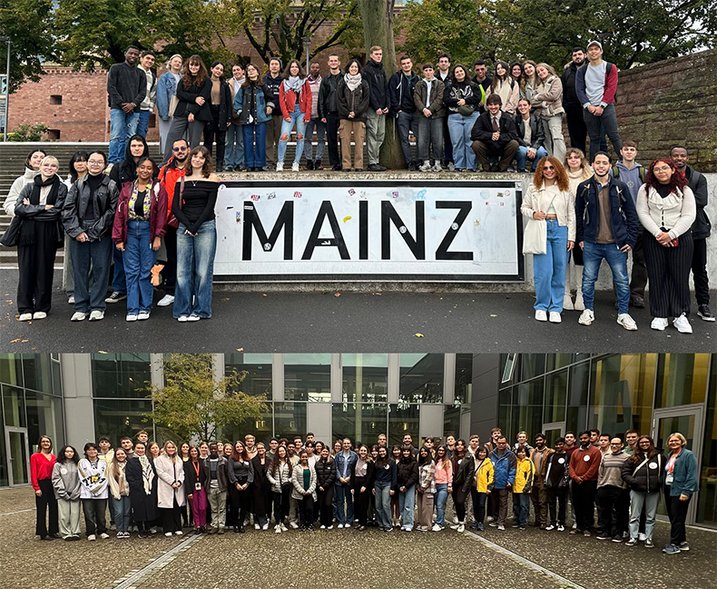Mainz University of Applied Sciences will participate in the Mainz Science Fair on September 9 and 10, 2023 with various projects and hands-on activities. The member institutions of the Mainz Research Alliance will present their research on this year’s theme of “People and Community” at Gutenbergplatz. True to the motto “Hands-on science,” visitors young and old can expect to experience a wide range of knowledge from Mainz University of Applied Sciences, which is participating this year with five institutes and numerous projects – for the first time, the LUX Pavilion is also opening its doors at the Mainz Science Fair. The collaborative project EMPOWER, the i3mainz–Institute for Spatial Information and Surveying Technology, mainzed–Mainz Center for Digitality in the Humanities and Cultural Sciences, the Research Group for Business Informatics and Media Management, and the Institute of Architecture Mainz with its international CoVHer project will be exhibiting at the LUX.
EMPOWER collaborative project
The latest trends – sustainability, health, cyber security, connectivity, new work environments – being researched in the EMPOWER joint project at universities in Rhineland-Palatinate can be experienced up close. Visitors are invited to design and create their own boards for eating breakfast and other 3D objects as part of Digital Manufacturing. They can experience possible courses of action in the digital realm for themselves in Mixed Reality Applications using virtual reality (VR) goggles and augmented reality (AR) user apps. In addition, those who wish to embark on a virtual journey to various locations can do so with the featured BaSeTaLK app. BaSeTaLK is the abbreviation for Biographiearbeit in Senioreneinrichtungen mit Tablet-Unterstützung zur Verbesserung der Lebensqualität und Kommunikation (Biographical Work at Senior Citizen Facilities with Tablet Support to Improve Quality of Life and Communication). Developed at Mainz Catholic University of Applied Sciences in cooperation with the Ostbayerische Technische Hochschule (OTH) Regensburg, the app takes residents of nursing homes on virtual outings. With questions, pictures, short stories, and songs, an invitation is extended to share stories about their lives. The BaSeTaLK app is being further upgraded as part of the EMPOWER project. For example, there are plans to work out location-based memories that can be used as a lasting conversation starter. In addition, children from the age of three can fill seed bags with native flower seeds as part of the Urban Experimentation Area. And those who want to take on the Hacking Challenge will get their money’s worth at the EMPOWER project’s Cyber Security exhibit.
i3mainz–Institute for Spatial Information and Surveying Technology
The i3mainz–Institute for Spatial Information and Surveying Technology works with Artificial Intelligence (AI) as part of the AI Lab. At the Science Fair, visitors can take a look inside the black box of AI with the aid of Explainable Artificial Intelligence: What happens to the data we enter into a model, what does AI do with it? The AI Lab is part of the TOPML (Trading Off Non-Functional Properties of Machine Learning) project at the Research Center for Machine Learning at Johannes Gutenberg University (JGU) and Mainz University of Applied Sciences. There, the interactions of machine learning properties are analyzed and weighed out
The future of housing is being studied by i3mainz in its RAFVINIERT project. Providing for the elderly is often a challenge, especially in rural areas. Concepts and tools are being developed to improve the analysis and planning of senior citizen-related services in rural single-family residential areas. Accessibility in Mainz can be explored on an interactive map. Various visualizations are provided for this purpose, such as the Walk Score and a reachability overview for each building..
mainzed–Mainz Center for Digitality in the Humanities and Cultural Sciences
Mainz Center for Digitality in the Humanities and Cultural Studies, or mainzed for short, is an alliance of six partners actively engaged in research and teaching that combine and strategically develop their competence in the field of digitally working humanities and cultural studies. In addition to Mainz University of Applied Sciences, its partners include Mainz Academy of Sciences and Literature, JGU, the Institute for Regional History of Rhineland-Palatinate (IGL), the Leibniz Institute of European History (IEG), and the Leibniz Center for Archaeology (LEIZA). Apart from research data infrastructures, the collaborative work focuses on digital methods in the fields of spatial humanities, language processing, linguistics, digital edition, music and multimedia, as well as web applications and semantic web technologies.
Research Group for Business Informatics and Media Management (WIMM)
The Research Group for Business Informatics and Media Management (WIMM) at Mainz University of Applied Sciences stands for innovation and interdisciplinary expertise. The three projects presented – AI4MediaData, Digital Geo Media (Travelguide), Digital Qualification – invite visitors to marvel at them and vividly demonstrate how media and IT are increasingly converging in the most diverse areas of life. The WIMM team is supported by Pepper – a humanoid robot designed to interact.
- Behind AI4MediaData – From Data Thinking to Data-Supported Decision Support is a project carried out jointly by Mainz University of Applied Sciences, ZDF Digital, the Fraunhofer Institute for Intelligent Analysis and Information Systems IAIS and the company DDG, which uses artificial intelligence to analyze media data and connect the information obtained in the process in the form of data-based decision support.
- In Digital Geo Media (Travelguide), the focus is on the development and validation of the media service Travelguide as an interface for location-based content recommendations. The purpose of the interface developed by Mainz University of Applied Sciences is to offer vehicle users comprehensive information for videos and multimedia content from the ARD Mediathek in their vicinity as a prototype in the Porsche infotainment system. The Travelguide service opens up a new way to explore media library content on the road.
- The WIMM research group is also active in the field of education. For example, a low-threshold learning offer for immigrants is being created with a focus on digital education. The learning modules that have been developed are constantly being improved. Visitors to the Mainz Science Fair can try out an online learning program on smartphone use for themselves.
Institute of Architecture at Mainz University of Applied Sciences in the LUX Pavilion
For the first time, the LUX Pavilion of Mainz University of Applied Sciences will take part in the Mainz Science Fair this year as another place where science can be experienced. Here, the history and architecture of Europe will be brought to life during the Science Market. The ERASMUS+ project CoVHer – Computer-based Visualisation of Architectural Cultural Heritage, showcased by the Institute of Architecture at Mainz University of Applied Sciences (AI MAINZ), will allow visitors to experience the methodology of digital 3D reconstruction, documentation, and communication of cultural heritage using augmented and virtual reality, as well as 3D printing. International students from all over Europe will also present their work on Saturday as part of the international CoVHer workshop week, accompanied by lectures on gamification and virtual reality. Cultural exchange, the broadening of perspectives and the fostering of international cooperation are guaranteed.
The researchers from Mainz University of Applied Sciences will also be represented on stage this year. Innovative research and transfer approaches will be presented and discussed with interested members of the public.
21st MAINZ SCIENCE FAIR 2023
When: Satuday, Sept. 9th from 10 am to 6 pm and Sunday Sept. 10 from 12 pm to 6 pm
Where: Gutenbergplatz, Mainz
Hands-on science: With this, the MAINZ SCIENCE FAIR attracts crowds to Gutenbergplatz. Visitors can experience the wonders of science up close. Enthusiastic researchers from the member institutions of the MAINZ RESEARCH ALLIANCE and other partners will present their research and a variety of projects on this year’s theme of “People and Community” in a series of tents and on the stage. The visit to the Science Fair is free of charge.
Kick-off on Saturday, September 9, 2023, 10 am, WIMA stage.
Opening discussion “Kaleidoscope of Science: Multiple Perspectives on its Role in the Community” with Clemens Hoch, Minister of Science and Health of the State of Rhineland-Palatinate, Nino Haase, Mayor of the Capital City of Mainz, Dr. Birgit Heide, Director of the State Museum of Mainz, Markus Müller, Artistic Director of the State Theater of Mainz, Dr. Sabine Nikolaus, Country Manager of Germany Boehringer Ingelheim Pharma GmbH & Co. KG, Prof. Dr. Susanne Weissman, President of Mainz University of Applied Sciences. Moderated by Univ.-Prof. Dr. Michael Maskos, Chairman of the Mainz Research Alliance and Director of the Fraunhofer IMM Institute.
Mainz Research Alliance thanks its members, sponsors, and partners:
Academy of Sciences and LiteratureMainz, BASF, biomindz, BioNTech AG, Bioscientia Healthcare GmbH, Boehringer Ingelheim Pharma GmbH & Co. KG, Deutsche Bundesbank Regional Office in Rhineland-Palatinate and Saarland, EMPOWER Transfer Alliance, Fraport, Fraunhofer Institute for Microengineering and Microsystems, Gutenberg Museum Mainz, Helmholtz Institute Mainz, Mainz University of Applied Sciences, Institute of Biotechnology and Drug Research, Institute for Historical Regional Studies Rhineland-Palatainate e.V., Institut für Molekulare Biologie gGmbH, Johannes Gutenberg University Mainz, Mainz Catholic University of Applied Sciences, the Capital City of Mainz, State Museum in Mainz – General Directorate of Cultural Heritage Rhineland-Palatinate, Leibniz Institute of European History, Leibniz Institute for Resilience Research, Leibniz Center for Archaeology, Mainzer Volksbank, Max Planck Institute for Chemistry, Max Planck Institute for Polymer Research, Ministry of Science and Health, Mainz Museum of Natural History – State Collection of Natural History of Rhineland-Palatinate, SCHOTT AG, Bingen Technical University of Applied Sciences, TRON gGmbH, University Medical Center of Johannes Gutenberg University Mainz.
Media partners include the Allgemeine Zeitung and Kruschel / Verlagsgruppe Rhein Main GmbH.




